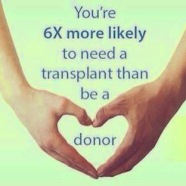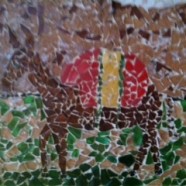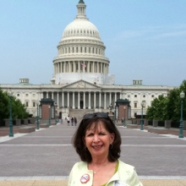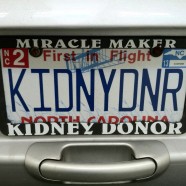A PKD mutation story by a powerhouse of a woman: Karyn Waxman
When people ask me to tell them about myself, I generally say that I am married to my soul mate, Jerry Waxman, I am the mother of two amazing daughters, Erica and Kim, “Grammy’ to our delightful granddaughter Eva, but I am also one of 12.5 million people who battles Polycystic Kidney Disease (PKD) every day. Karyn Waxman, PKD Foundation Memphis Chapter Coordinator Events Facebook Pinterest Linkedin Share to raise awareness. PKD – Polycystic Kidney Disease PKD took my life by storm fifteen years ago. While vacationing with my husband I developed a raging kidney infection that resulted in a lengthy hospital stay. The doctor who treated me, a family friend, told me that I had ‘funny looking kidneys that were not where they are supposed to be,’ but not to worry because ‘not everyone’s anatomically correct!’ His words resonated with me when the pain I was experiencing refused to ease up. When I complained about still experiencing pain and malaise three weeks after my release from the hospital, he told me that he believed I was fine, but that ‘we could look further.’ I insisted something was wrong and a CT scan was scheduled the following week. The test revealed numerous cysts, too many to count, completely covering and distorting my kidneys, liver, and ovaries……I was diagnosed with ‘text book’ PKD. Having never heard of PKD before I was frightened and frantically began a thorough Google search to learn I all could about a disease that could potentially challenge my life. I quickly discovered that PKD is one of the world’s most common dominant genetic life threatening diseases known to man. It is an equal opportunity disease and affects men, women, and children of all ages as well as people of all ethnicities. PKD causes cysts, or small sacs of fluid, to develop on, in, and throughout the kidneys forcing them to enlarge and ultimately lose their ability to adequately filter toxins from the blood stream. In fact, polycystic kidneys can grow to be as large as footballs and weigh as much as 30 lbs. each! Symptoms of PKD include chronic pain in the back, sides, and abdomen, chronic urinary tract infections, distended abdomen, kidney stones, blood in the urine, high blood pressure, and family history of kidney disease. PKD is the 4th leading cause of kidney failure with nearly 60% of its victims requiring dialysis or transplant to survive. PKD patients are also at a high risk for developing cardiovascular disease as well as intracranial aneurysms. Sadly, there is currently no known treatment or cure for PKD. While dialysis and transplant are reasonable treatments for kidney failure, neither options stop the pain and suffering that are associated with this disease. While digesting all of the ugly facts about PKD, a pivotal moment for me came with the understanding that neither of my parents had PKD and yet I had developed it as a result of spontaneous genetic mutation. Because PKD is a dominant genetic disorder, this meant there was still a 50% chance that I had inadvertently passed it onto one or both of our daughters. Knowing that I might have given our girls a potentially life threatening disease was torturous for me, and extremely difficult for my husband. After all, what if all the women in his life were fundamentally at risk for all the ill effects of PKD? And to think, there was nothing we could do about it….no treatment or cure….. We were both overwhelmed and distraught. It didn’t take me long to realize that doing nothing about this emotionally and physically challenging situation was...
Read MoreThe Word ‘Cadaver’
Yesterday, on ABC’s The Bachelor TV show, an insensitive comment was used about a ‘cadaver’ donor. The word “cadaver” should not have been used. Many donor families – people with a family member who died and donated his or her organs after death – are upset at the use of the word ‘cadaver’. Because each family’s loved one was a person, loved and cherished, and not just a dead body. Many donor families are outraged. My mother received her transplant in 1988 and the word ‘cadaver’ was used. That was the word used by the medical community back then to indicate the organ transplanted was from a deceased person. Later, it was considered insensitive. Mom stopped using the word “cadaver” too, although any donor who has received a transplant never thinks of their donor as a ‘cadaver’ or a dead person. They think of them as their angel. Mom’s donor was the first person she wanted to meet in heaven after she paid her respects to God. Words. Yes, words can hurt. But, let’s not get hung up on words. Why not get hung up on the fact that over 120,000 people are waiting for a life-saving organ transplant? To be an organ donor in the event of sudden or unexpected death is one of the noblest things anyone can do for their fellow man. Become an organ donor! I promise someone will call you an...
Read MoreChristmas 2014
It’s been a banner year for The Reluctant Donor. A fourth printing – and the opportunities to tell the world about my mother and her siblings – has been very humbling, exciting, and special. The love they gave me is the greatest of all gifts. So much is happening and has happened in the treatment of kidney disease, that I know they would be astounded. Back to my grandmother’s days when she began kidney failure in the 1940’s, progress has been made. Told there was nothing more the doctors could do for my grandmother and her failing kidneys, to the invention of a dialysis machine, , to transplanting organs from one person to another, to paired exchange organ transplants, to new ways of dialyzing without having to sit still, and to possibly building and creating new kidneys in a lab. Sadly, if you are suffering and in pain today, that is not enough. Because kidney disease still has a long way to go. If The Reluctant Donor can somehow bring peace and hope and joy and laughter to someone suffering today through the courageous stories of those who went before them, I will feel as though I am helping a bit. The spark of life that we all carry within us as we live and breathe is divine. It’s such a mystery, this life we live. The magic of it, the power of it, the beauty and the pain and sorrow of it; I don’t pretend to know the why of it. But, I believe it is the greatest gift. What we do with this gift of life is up to each of us. I took life for granted in my younger years. It has been the greatest and best gift I’ve ever received despite pain and sadness. As I grow older and as I celebrate another Christmas with all the mysteries, wonder and fascination of the story of Mary, Joseph and the baby Jesus, I marvel. A baby was born....
Read MoreThe Great Unifier for Congress
I have often said that organ donation is the great unifier. I’ve said it on Capitol Hill when I visited my Senators and Representative offices to voice my opinions on issues that affect kidney patients and organ donation. The elections might be over and you can breathe a sigh of relief because the millions of dollars spent on campaigns will stop! But, roll up your sleeves and get to work. I mean you, not them . . . find out who your Senators and Representatives are. Get their contact information. Then, remember this critical fact: They work for you. Reach out to them. Extend respect, common sense and professional courtesy, because you can make a difference. Why? Because if you are a kidney patient or have a loved one affected by kidney disease, or are part of the organ donation community, it is time to tell your story to your elected official. Life can change in an instant. You can become part of this community suddenly. Maybe you have lost a loved one and donated his or her organs so someone else can live. Your sorrow is someone’s joy. You and our family exemplify the Golden Rule. Your example can help our elected officials learn it is time to work together for the good of the United States of America. Maybe you have received a transplant? Maybe you are someone who needs a transplant? Either from a living donor or a deceased donor, it doesn’t matter. You are unique because you will probably be able to tell your elected official you didn’t or don’t care if your donor was a Democrat, a Republican, or an Independent. See what I mean? If you or someone you love needs a life-saving organ transplant, it doesn’t matter who donates. Organ donation is the great unifier. There are serious issues regarding organ donation Congress needs to address. The laws regarding the prescription drugs needed to keep a transplanted organ from rejection were written long ago and need to be addressed.It doesn’t make sense for someone to lose a transplanted organ because they cannot afford the medication needed to keep that organ. Medicare covers dialysis, an artificial kidney – and for anyone who has read my book, The Reluctant Donor, you’ll understand why I thank God every day anyone with failing kidneys has this resource. My heart still aches. A year of dialysis costs far more than the prescription drugs to keep a transplanted kidney from rejecting. And, if a patient loses a transplanted kidney, that patient will need another transplant, which costs four to five more times the cost of the drugs! Bring these issues along with your personal story to your elected officials. Be respectful, have your facts, and think about solutions. Let your voice be heard because all things are possible if we work together. A living kidney donor saves our federal government millions of dollars keeping the recipient off of dialysis. An organ transplant recipient, whether the organ was from a living or a deceased donor, becomes a contributing member of society. Along with their new health, most recipients are filled with so much gratitude their cup overflows . . . whether or not the donor was a Democrat, Republican or Independent....
Read MoreHappy Ten Year Kidney-versary to us!
Psalms 47:1 Clap your hands, all peoples! Shout to God with loud songs of joy! Oh, the joy of it! Ten years ago today, I felt incredible joy – yes, in my soul – but also in my kidney! I remember how I pushed my IV pole into my sister JoAnn’s hospital room. She was propped up in bed with a tube still in her nose, color in her cheeks, sparkle in her eyes, and her beautiful smile. Radiant joy! I’ve often said it was her hair that caught my eye. If hair can come to life – lustrous, shiny, glistening hair, that’s what her hair did. The healthy sheen of hair speaks to me, saying, “the kidney is working, Alleluia! It is performing its miracle we call life.” A doubting Thomas or a snide, skeptical person could attribute the giddiness, the soaring, rocketing joy I felt to the anesthesia I had only hours earlier. Yes, it was the miracle of modern science and transplantation to remove a healthy kidney and place it into another person- someone with diseased kidneys. An unbeliever would say it was not angels or miracles. Aah, I feel sorrow for the doubters! The miracle of life, the gift of faith from my ancestors, the lessons of courage they taught me, and the power of prayer and what it can do was the greatest lesson I experienced ten years ago today. Blessedly it changed my sister’s life, just as our mother and other sister’s lives were changed by the magic of organ donation. But, for me, the whiniest, most terrified and reluctant donor on the face of the earth, it transformed my life. I never would’ve been able to do it without the support of St.William, my beautiful daughters, family and the best friends a woman could ever have. I live now with a feeling of gratitude and am ashamed I didn’t always. My sister, JoAnn, untethered to a dialysis machine to keep her alive, is doing well. She danced at both of her daughter’s weddings and met her new baby grandson on the day he was born. The joy brings the gratitude, but the gratitude brings a sense of duty or a calling to me. I am embarrassed to be called a hero. I dislike it so much as do many of the living donors I’ve met. I know (and you know) I would never have been a living kidney donor in a zillion years if I wasn’t lucky enough to be born into such a magnificent family. A family with lousy kidneys caused by polycystic kidney disease (PKD). There is much work to be done. I want to tell the world about PKD, to find a cure, and try to bring hope! I have family battling PKD now. I have friends battling it. One just became a grandmother. A young mother, a father, a teenager (she’s a princess of a girl), and a gorgeous grandmother all stunned by the unfairness of a mutation. There are strangers with PKD I’ve never met who have become friends. I want to cover my ears and cry when I hear about transplants that failed, donors who have lost their recipient, or about someone who doesn’t have a donor. They spur me to work. It frustrates me to hear about another fistula being put in another arm (two within one week in one family) and yet my heart knows dialysis is a lifesaver. I want to wave a magic wand to stop the relentlessness PKD makes into lives – back pain and flank pain, nausea and vomiting, diverticulitis, aneurysms,...
Read More





